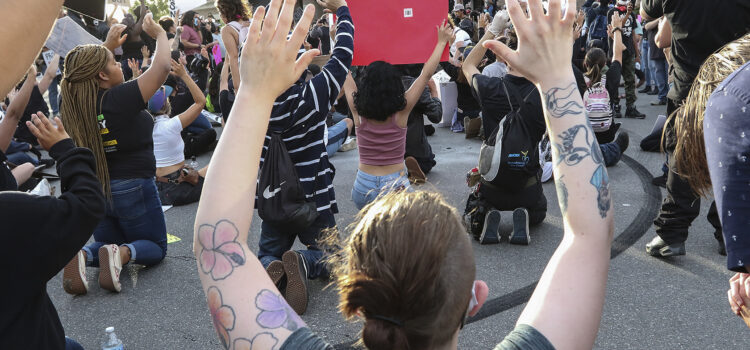
For the past two weeks, people have been gathering for protests and rallies to stand in solidarity with George Floyd and the Black Lives Matter movement and to demand an end to police violence.
However, safety at protests continues to be a concern.
Although many protests have been peaceful, there have been reports of harassment against protesters. In one case, a protester’s car was burned down (Officials have not confirmed if this was a hate crime related to the protest.), and last week, a man died after being struck by a vehicle while he was protesting in the street.
As if this wasn’t enough to worry about, protesters must still try to remain safe and healthy in the midst of the COVID-19 pandemic in Kern, where the transmission rate continues to rise.
When people protest, they should try their best to remain safe at all times.,
Kern Sol News has put together a list of tips, with help from some community leaders, to help you protect yourself and your community.
Preparing for a protest
- Protect your communication by downloading Signal, an application that encrypts your text messages and calls. Protesters can connect with their group through the app.
- Inform a trusted relative or friend of your participation in the protest, in case you get detained or injured.
- Have an emergency contact number memorized.
- Have a meet up spot and leave the cars there.
- Have a partner at all times.
- Use nicknames you can remember instead of real name.
- Be aware of your surroundings.
- Carry with you a bottle of water and baking soda/ Salines Water. This will help if you get pepper sprayed or come into contact with tear gas.
- Leave illegal substances and weapons at home.
- Bring a state ID/ school ID
- Carry water and spare cash.
- If you can’t leave your phone at home, turn off face ID and add a strong password.
Protesting while undocummented
- Carry a U.S. Picture ID Ex. college ID/ Library card (leave other documents at home)
- Do not post on your social media your attending
- Use a mask that will not show the shape of your face
- Carry “Know your Rights” card
- Look up rapid response hotline numbers in your county and write them down somewhere safe in case you need them.
- Do not post any picture after the protest that’s self incriminating
How to properly gear
- Wear comfortable clothes. Cover any identifying traits, such as tattoos, piercings, or hair color.
- Wear comfortable closed-toed shoes
- Bring an N-95 mask or bandana to protect yourself from COVID-19 transmission
- Bring sunglasses
- Don’t wear earrings, contact lenses or hoodies. Keep your hair up.
During Protest
- Identify a point person
- Try to keep your face covering on as much as possible
- Never wander off alone.
- Have a meet up point just in case of an outbreak of chaos.
- Avoid confrontation with law enforcement.
After Protest
- Walk back to your car with your group of people.
- Wipe your phone, bags, shoes down with disinfectant.
- Do not post any pictures exposing peoples faces to prevent harassment. Blur people’s faces so they can’t be identified.
- Do not tag people in social media posts.
- Do some sort of self-care.
If you are arrested or stoped the ACLU advices
- Stay calm. Make sure to keep your hands visible. Don’t argue, resist, or obstruct the police, even if you believe they are violating your rights. Point out that you are not disrupting anyone else’s activity and that the First Amendment protects your actions.
- Ask if you are free to leave. If the officer says yes, calmly walk away.
- If you are under arrest, you have a right to ask why. Otherwise, say you wish to remain silent and ask for a lawyer immediately. Don’t say anything or sign anything without a lawyer.
- You have the right to make a local phone call, and if you’re calling your lawyer, police are not allowed to listen.
- You never have to consent to a search of yourself or your belongings. If you do explicitly consent, it can affect you later in court.
- Police may “pat down” your clothing if they suspect you have a weapon and may search you after an arrest.
- Police officers may not confiscate or demand to view your photographs or video without a warrant, nor may they delete data under any circumstances. However, they may order citizens to cease activities that are truly interfering with legitimate law enforcement operations.
What to do if you believe your rights have been violated
- When you can, write down everything you remember, including the officers’ badge and patrol car numbers and the agency they work for.
- Get contact information for witnesses.
- Take photographs of any injuries.
- Once you have all of this information, you can file a written complaint with the agency’s internal affairs division or civilian complaint board.
Featured Photo: “Hands up, don’t shoot,” was the chant as armed officers watched over protestors from a Bakersfield City building across from the BPD. Hundreds of people protested the death of George Floyd Friday, May 29, 2020, in front of the Bakersfield Police Department in downtown Bakersfield. Photo by Henry Barrios for Kern Sol News